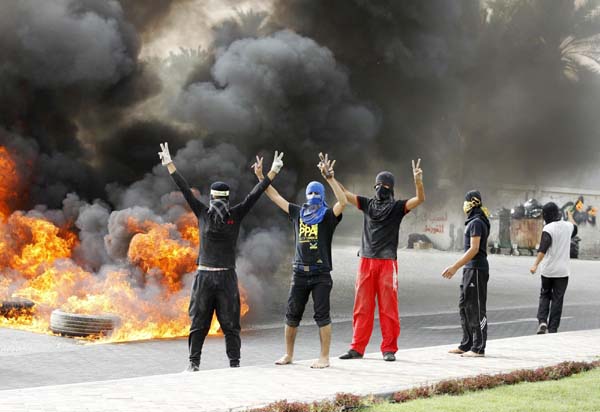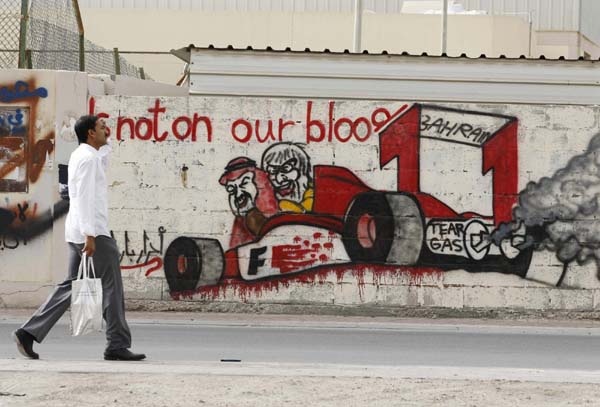F1 teams to race while rage boils in Bahrain
Updated: 2012-04-22 17:01
(Agencies)
|
||||||||
MANAMA - Formula One drivers will race in Bahrain on Sunday while rage boils on the streets outside, among protesters who denounce the Grand Prix as a gaudy spectacle by a ruling family that crushed Arab Spring demonstrations last year.
 |
|
Anti-government protesters flash victory signs as they burn tyres in Budaiya, west of Manama, early April 22, 2012.[Photo/Agencies] |
Demonstrators hurling petrol bombs have clashed nightly with police during the past week, and security forces responded with teargas, rubber bullets and birdshot.
Black smoke from burning tyres wafted over Budaiya on Sunday morning, before the final race. Budaiya, outside the capital of Manama, was the scene of mass protests on Friday.
The death of 36-year-old protester Salah Abbas Habib - found sprawled on a rooftop on Saturday after overnight clashes - provides more fuel for outrage among a Shi'ite Muslim majority that complains of being marginalised by ruling Sunnis.
His funeral could be held on Sunday if his family recovers his body, setting the stage for riots on race day.
The luxury sporting event is the government's chance to prove that life has gone back to normal in the island kingdom after security concerns over anti-government demonstrations forced last year's race to be cancelled.
King Hamad bin Isa al-Khalifa, who will attend Sunday's race, said in a statement overnight that he wanted "to make clear my personal commitment to reform and reconciliation in our great country. The door is always open for sincere dialogue amongst all our people."
Bahrain, a close military ally of the United States, is the only one of the Gulf monarchies to have been seriously threatened by Arab Spring protests that brought down the rulers of Tunisia, Egypt, Libya and Yemen since the start of 2011.
"Our initial demands were to elect a new government but after the disgusting abuse we received, all the people are asking for is for the regime to fall," said protester Ahmed Madani during a march of 7,000 people on Saturday.
Some banners held up during the march depicted Formula One race car drivers as riot police beating up protesters.
 |
|
A man walks past a wall with anti-Formula One graffiti in a village in Diraz, west of Manama early April 22, 2012.[Photo/Agencies] |
'Stuff that really matters'
The violence outside has had virtually no impact within the sealed bubble of Formula One, apart from a few staff of two teams who witnessed a petrol bomb-throwing incident.
Red Bull's world champion Sebastian Vettel, who starts at pole position, said shortly after arrival on Thursday that he thought much of what was being reported was hype.
He looked forward to getting in the car and dealing with the "stuff that really matters - tyre temperatures, cars".
But nightly TV images of streets ablaze with clouds of smoke and teargas are an embarrassment for Formula One and the global brands that lavish it with sponsorship. Thomson Reuters, parent company of Reuters, is a sponsor of the Williams Formula One team.
Jean Todt, president of Formula One's governing body, the International Automobile Federation, broke a media silence on Saturday to say he was sorry "about what has been reported".
"I am not sure that all that has been reported corresponds to the reality of what is happening in this country," he added.
The Bahrain government says it has enacted reforms after cracking down on demonstrators last year while revolts were sweeping across the Arab world.
Bahrain's government is thought to have spent $40 million to host the event. While motor sports journalists have been invited to cover it, reporters from Reuters and some other news organisations who normally write about Middle East politics have been denied visas.
Hackers brought down the F1 website intermittently on Friday and defaced another site, f1-racers.net, to support what they described as the Bahraini people's struggle against oppression.
The race has drawn more than 100,000 visitors and generated over $500 million in spending. It has been a symbol of pride for the ruling royal family since Crown Prince Sheikh Salman bin Hamad al-Khalifa brought the first Formula One Grand Prix to the region in 2004.
The continued hunger strike of Abdulhadi al-Khawaja, one of 14 men jailed for leading last year's uprising, is further inflaming the street and his health has entered a critical stage after more than 70 days. His family says he stopped taking water on Friday, raising fears for his life.
The Interior Ministry said on Sunday via Twitter that Khawaja was in "good health". Khawaja is due to meet the ambassador from Denmark, where he also holds citizenship, which has asked for Khawaja to be released into their care.

 'Taken 2' grabs movie box office crown
'Taken 2' grabs movie box office crown
 Rihanna's 'Diamonds' tops UK pop chart
Rihanna's 'Diamonds' tops UK pop chart
 Fans get look at vintage Rolling Stones
Fans get look at vintage Rolling Stones
 Celebrities attend Power of Women event
Celebrities attend Power of Women event
 Ang Lee breaks 'every rule' to make unlikely new Life of Pi film
Ang Lee breaks 'every rule' to make unlikely new Life of Pi film
 Rihanna almost thrown out of nightclub
Rihanna almost thrown out of nightclub
 'Dark Knight' wins weekend box office
'Dark Knight' wins weekend box office
 'Total Recall' stars gather in Beverly Hills
'Total Recall' stars gather in Beverly Hills
Most Viewed
Editor's Picks

|

|

|

|

|

|
Today's Top News
Health new priority for quake zone
Xi meets US top military officer
Japan's boats driven out of Diaoyu
China mulls online shopping legislation
Bird flu death toll rises to 22
Putin appoints new ambassador to China
Japanese ships blocked from Diaoyu Islands
Inspired by Guan, more Chinese pick up golf
US Weekly

|

|






